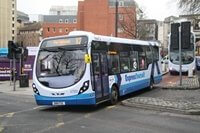
Competition watchdog calls for LTAs to demonstrate that franchising would not have a severe negative effect on competition before it is implemented
Douglass Cooper of the Competition and Markets Authority (CMA) has made a blog post entitled ‘Bus Services Bill: retaining the benefits of competition, which appears to show preference for competition in a deregulated market.
The post reads: “The government has introduced the current Bus Services Bill to broaden the powers available to LTAs (Local Transport Authorities) to improve local bus provision. The Bill’s main elements are introducing ‘enhanced partnerships’ that provide much greater flexibility than existing partnership rules, and – for areas with directly elected mayors – making it easier to introduce franchising.
“The CMA welcomes the increased flexibility offered by the Bill. Local bus markets are complex and varied – a ‘one-size-fits-all’ solution simply isn’t realistic. We recognise that the introduction of franchising may be appropriate in specific circumstances – but we continue to believe that on-road competition should only be abandoned in favour of competition for the market where it’s clear that this is the only way to secure better outcomes for the travelling public.
“Where the deregulated market isn’t delivering what’s needed, improved outcomes are often most likely to be secured by making the local market work better. This could be through practical solutions, such as introducing or enhancing multi-operator travel cards or through the development of effective local partnerships.”
The CMA recommended that LTAs should be obliged to: consider how best to make the deregulated market work so the benefits of competition for passengers can be retained; carefully assess the impact of their proposed action – be it a partnership scheme or franchising – including the impact on local competition; demonstrate that any distortion to competition created by the proposed arrangements would be justified by the contribution to achieving other policy aims; and consult openly..
Responding, Simon Posner, CPT CEO, told CBW: “The bus industry is firmly of the view that the best bus services are delivered where competing operators work in a spirit of partnership with a local authority. CPT has been very keen to ensure that the measures contained in the Bus Services Bill allow partnership working to continue and therefore welcomes the recommendations from the CMA which clearly recognises the benefits of the deregulated market.
“Franchising of local bus services would be a major step for any local authority to take and decisions should not be taken lightly. There must be a robust process in place for assessing a franchise and CPT very much agrees with the CMA’s recommendations.”
Dr Jon Lamonte, Chairman of the Urban Transport Group (UTG), said: “Better bus services are crucial for our major regional cities to deliver inclusive growth. However, current powers to co-ordinate and improve bus services falls far short of what cities outside London need.
“We are pleased therefore that the Competition and Markets Authority (CMA) recognises the need for the Bus Services Bill to provide LTAs with a wider and fuller range of powers to improve local bus services, including the franchising of networks of bus services. However, we do not share the CMA’s view that a new set of hurdles and criteria needs to be introduced before cities can be allowed to co-ordinate bus services through franchising.
“The CMA view appears to rest on the assumption that on-street competition is inherently preferable to competition for a contract to provide a network of services. We believe that there can be wider benefits to bus passengers, and for our cities’ wider aspirations on transport, of having a straight-forward method of replacing on-street competition with for-the-market franchising competition.
“In this respect it should also be remembered that the two previous Acts that sought to reform bus services in 2000 and 2008 have proved to be unusable in practice in relation to the introduction of bus franchising because the hurdles and tests they contained were disproportionate.”

